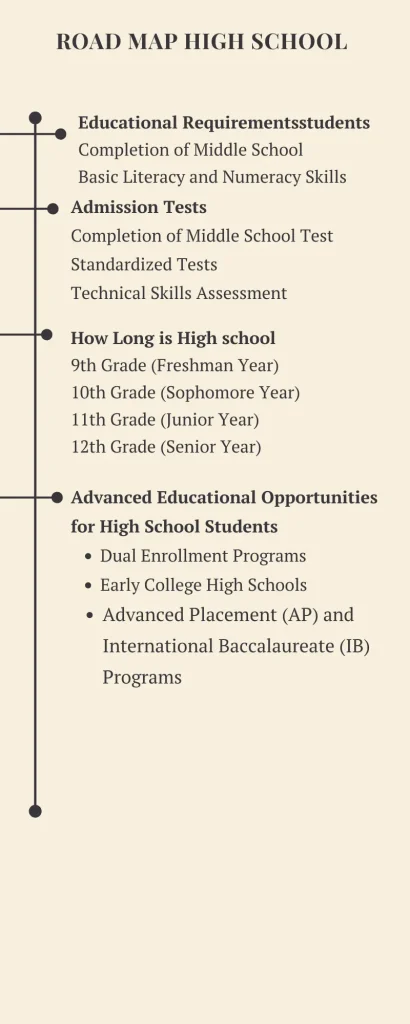How Long is High School
High school typically lasts four years, starting from 9th grade and continuing through 12th grade. In the United States, students usually begin high school around age 14 and graduate at about age 18. Understanding “How Long is high School” helps in planning for future academic or career goals.
What is High School
High school is an educational institution that serves students in grades 9 through 12. It provides a comprehensive curriculum designed to prepare students for higher education or the workforce. Courses often include core subjects like math, science, English, and social studies, as well as elective options such as art, music, and technology.

In addition to academics, high schools offer various extracurricular activities, including sports, clubs, and community service opportunities. These activities help students develop social skills, leadership abilities, and personal interests. High school plays a crucial role in the overall development of young individuals, setting the foundation for their future success.
How Long is High School
9th Grade (Freshman Year)
Age Range: Typically 14-15 years old.
Focus: Transition from middle school to high school, building a strong academic foundation.
Core Subjects: English, Math, Science, and Social Studies.
Electives: Introduction to elective courses like foreign languages, art, and physical education.
Extracurriculars: Encouraged to explore various clubs and sports to find interests.
10th Grade (Sophomore Year)
Age Range: Typically 15-16 years old.
Focus: Building on the freshman year foundation, beginning to explore career interests.
Core Subjects: Continued study in English, Math, Science, and Social Studies.
Electives: More advanced elective courses, often with prerequisites.
Extracurriculars: Greater involvement in clubs, sports, and possibly leadership roles.
11th Grade (Junior Year)
Age Range: Typically 16-17 years old.
Focus: Preparing for college entrance exams (SAT/ACT), narrowing down career interests.
Core Subjects: Advanced coursework in core subjects, often including AP or honors classes.
Electives: Specialized electives related to potential college majors or careers.
Extracurriculars: Leadership roles in clubs and sports, participation in community service.
12th Grade (Senior Year)
Age Range: Typically 17-18 years old.
Focus: Final preparation for graduation and post-secondary plans (college, vocational training, workforce).
Core Subjects: Completion of graduation requirements, often including senior projects or theses.
Electives: Finalization of elective credits, possibly including dual-enrollment courses for college credit.
Extracurriculars: Capstone projects, leadership positions, and significant involvement in extracurriculars.

How to Enter High School
Educational Requirements for High School
Completion of Middle School: Students must successfully complete 8th grade to enter high school.
Basic Literacy and Numeracy Skills: Proficiency in reading, writing, and basic math.
Age Requirement: Typically, students must be around 14-15 years old when they start 9th grade.
Entry Tests for High School
Standardized Tests: Some specialized or magnet high schools require entry tests such as the SHSAT (Specialized High Schools Admissions Test) in New York City.
Placement Tests: Schools may administer placement tests to determine appropriate course levels in subjects like math and English.
Language Proficiency Tests: For non-native English speakers, tests like the TOEFL Junior may be required.
Application Process for High School
Public High Schools:
Zoning: Enrollment is generally based on the student’s residential address.
School Choice: In some districts, students can apply to different schools within the district based on preference.
Magnet and Specialized High Schools:
Application Form: Complete and submit the application form by the specified deadline.
Entrance Exam: Take required entrance exams (if applicable).
Essays and Interviews: Some schools require personal essays or interviews as part of the application process.
Recommendation Letters: Obtain recommendation letters from teachers or counselors.
Private High Schools:
Application Form: Fill out and submit the detailed application form.
Entrance Exam: Many private schools require tests like the SSAT or ISEE.
Interviews: Participate in interviews with admissions officers.
Essays: Submit personal essays or statements.
Recommendation Letters: Provide recommendation letters from teachers or other relevant adults.
Application Fee: Pay the required application fee.
Financial Aid for High School
Public High Schools:
Free Education: Generally, public high schools do not charge tuition.
Fee Waivers: Available for standardized tests and extracurricular activities for low-income students.
Private High Schools:
Scholarships: Merit-based scholarships awarded based on academic, artistic, or athletic achievements.
Need-Based Financial Aid: Financial aid packages based on the family’s financial situation.
Payment Plans: Options to pay tuition in installments.
Magnet and Specialized High Schools:
Reduced Fees: Some schools offer reduced fees for low-income families for certain programs or activities.
Grants and Scholarships: Specific grants or scholarships may be available for students meeting certain criteria.
Additional Financial Aid:
Government Programs: Federal and state programs providing financial assistance to eligible families.
Community Organizations: Local organizations and charities that offer grants and scholarships.
Work-Study Programs: Part-time work opportunities within the school or community to help cover costs.
Advanced Educational Opportunities for High School Students
1. Dual Enrollment Programs
Description: Allows high school students to take college-level courses and earn both high school and college credit.
Purpose: Provides an introduction to higher education and can help students complete college credits before graduating high school.
Benefits: Accelerates the educational timeline and can reduce the total time and cost of obtaining a degree.
2. Early College High Schools
Description: High schools that offer a curriculum designed to provide a high school diploma along with an associate’s degree or a significant number of college credits.
Purpose: Prepares students for higher education and provides a head start on college-level coursework.
Benefits: Reduces the number of years needed to complete a bachelor’s degree.
3. Advanced Placement (AP) and International Baccalaureate (IB) Programs
Description: High school programs offering college-level courses and exams that can lead to college credit if scores are high enough.
Purpose: Prepares students for college-level work and can demonstrate academic capability to college admissions committees.
Benefits: Enhances college applications and can provide college credits.
Top 10 High Schools

1.Thomas Jefferson High School for Science and Technology (TJHSST)
Location: Alexandria, Virginia
Highlights: Known for its rigorous STEM curriculum and excellent college placement.
2.Horace Greeley High School
Location: Chappaqua, New York
Highlights: Offers a strong academic program with a wide range of advanced placement courses.
3.Phillips Exeter Academy
Location: Exeter, New Hampshire
Highlights: Prestigious private school with a strong emphasis on academic excellence and a diverse curriculum.
4.Phillips Andover Academy
Location: Andover, Massachusetts
Highlights: Offers a challenging academic program and extensive extracurricular opportunities.
5.Harvard-Westlake School
Location: Los Angeles, California
Highlights: Renowned for its academic rigor and strong college placement record.
6.The Lawrenceville School
Location: Lawrenceville, New Jersey
Highlights: Offers a rigorous academic program and has a strong focus on preparing students for top universities.
7.The Brearley School
Location: New York City, New York
Highlights: An all-girls private school known for its strong academic curriculum and college preparation.
8.Laurel Springs School
Location: Ojai, California (Online)
Highlights: Offers a flexible, personalized education with a strong emphasis on college readiness.
9.Ransom Everglades School
Location: Miami, Florida
Highlights: Known for its strong academic program, diverse student body, and strong college placement.
10.The Dalton School
Location: New York City, New York
Highlights: Offers a progressive educational model with a strong academic curriculum and emphasis on critical thinking.
These schools are recognized for their academic excellence, extracurricular opportunities, and overall impact on student success. Rankings can vary based on different sources and criteria, but these institutions are widely regarded as some of the best in the U.S.
Factors Affecting the Length of High School
The length of high school in most educational systems is generally fixed at four years, covering grades 9 through 12. However, there are various factors that can affect a student’s experience and the duration of their high school education. Here’s an overview of these factors:
1. Curriculum and Graduation Requirements
State or Country Requirements: Different states or countries have specific graduation requirements, which can affect how long it takes to complete high school. Some regions may have additional required courses or credits.
Advanced Placement (AP) and International Baccalaureate (IB) Programs: Participation in AP or IB programs can potentially accelerate a student’s high school career by allowing them to earn college credits.
2. Academic Performance
Course Load: Students who take a heavier course load, including advanced or honors classes, might finish high school faster if they earn enough credits.
Credit Recovery: Students who fail courses may need to retake them, potentially extending their time in high school.
3. Personal Circumstances
Transferring Schools: Moving to a new school can affect graduation timelines, especially if credits do not transfer or if the new school has different graduation requirements.
Health Issues: Prolonged absences or health issues might lead to an extended high school duration.
4. Special Programs
Dual Enrollment: High school students who participate in dual enrollment programs may complete their high school education earlier by earning college credits simultaneously.
Early Graduation Programs: Some schools offer programs that allow students to graduate early based on academic performance or completion of required coursework.
5. School Type and Structure
Traditional High Schools: Typically follow a four-year structure with a fixed duration.
Early College High Schools: Some high schools are designed to allow students to earn an associate degree or significant college credits alongside their high school diploma, potentially altering the traditional timeline.
Alternative High Schools: Schools with non-traditional approaches may offer flexible schedules or personalized graduation plans that can impact the length of high school education.
6. Extracurricular Involvement
Specialized Programs: Participation in specialized programs, like arts or athletics, may influence the high school experience, although it generally does not change the overall length of time required for graduation.
Final Verdict
High school typically spans four years, but various factors such as curriculum, academic performance, and personal circumstances can influence this timeline. Understanding these factors helps students and parents effectively plan and navigate the educational journey for a successful transition to post-secondary education.
FAQs
1.What is the standard length of high school?
High school generally lasts four years, from 9th grade to 12th grade.
2.Can high school be completed in less than four years?
Yes, students may graduate early through advanced coursework, dual enrollment, or accelerated programs.
3.What factors can extend the length of high school?
Factors include credit recovery, transferring schools, health issues, and additional graduation requirements.
4.How do specialized programs impact high school duration?
Programs like early college or dual enrollment may shorten the high school experience by offering college credits.
5.Can extracurricular activities affect high school graduation?
While extracurriculars enhance the high school experience, they generally do not affect the overall duration required to graduate.
